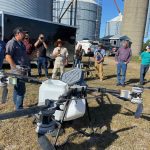Drones are a tool that can help farmers with cover crop planting in still-growing corn and soybeans.


The first of a three-year project has found more biomass from earlier drone broadcasting of seed

Prairie Clean Energy to pelletize flax straw for animal bedding

Biofuel groups still feel shortchanged

Some projects may be handed to other family members


Producing renewable electricity from farm biomass would be the ultimate closed loop

The University of Winnipeg’s new biomass heating system will be a model for other institutions, say proponents of alternative energy sources
When school starts this fall, the University of Winnipeg will flip the switch on a novel way to keep downtown buildings heated — with boilers that burn wood pellets. Last fall the downtown university took delivery of two 100-kilowatt biomass boilers, to provide supplementary heating a steam plant now provides for its Ashdown, Manitoba and

Manitoba could be a global leader in this sector of the bioeconomy

Researchers devise a way to reduce the amount of enzymes needed to convert biomass into biofuels